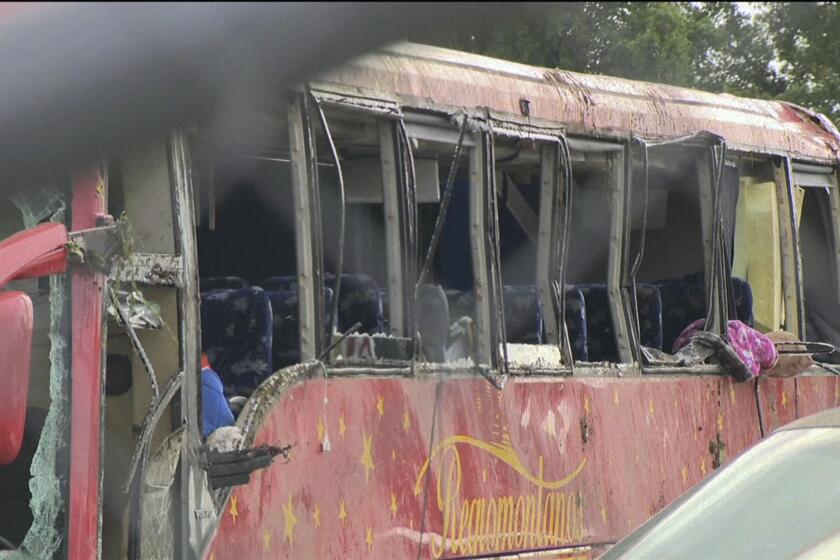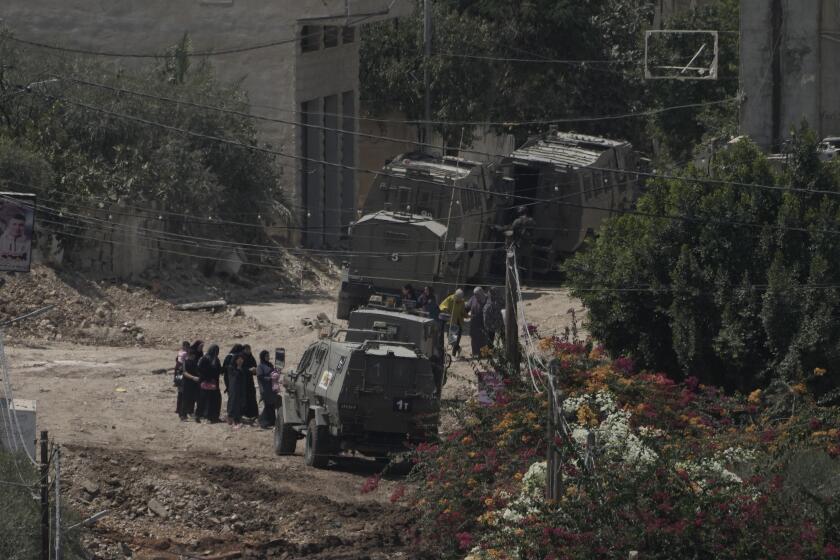Israel Rejects U.N. Demand on Deportees
Israel told the United Nations on Sunday that it will neither take back the 415 Palestinians it expelled to southern Lebanon nor permit the Red Cross and the United Nations to assist them through territory it controls.
Prime Minister Yitzhak Rabin, rejecting the widespread international condemnation of the Israeli move, said the Muslim fundamentalists trapped for almost two weeks in a freezing no-man’s-land are now Lebanon’s problem, not Israel’s, and that the matter is closed as far as he is concerned.
“It is not a humanitarian issue,” Rabin asserted bluntly after meeting with James Jonah, the U.N. undersecretary general for political affairs. “It is a decision by the Lebanese government that these people under its control are prevented from getting any food supplies.”
Israel’s action was based on its determination to fight terrorism, Rabin said, and thus will not be reconsidered despite a resolution by the U.N. Security Council condemning the Palestinians’ expulsion as a violation of international law and demanding their immediate repatriation to the occupied West Bank and Gaza Strip.
The men were “instigators and organizers of terrorism,” Rabin declared, and “Islamic fundamentalist terror groups” will remain the “target for the special and exceptional measures we have taken.”
Jonah, a veteran U.N. diplomat, did not respond to Rabin’s assertions, though he was backed by a Security Council resolution castigating Israel and demanding action from it to correct the situation.
Rabin’s unyielding toughness made it clear that, despite the criticism abroad and controversy at home, he remains convinced of the correctness of his decision to deport the Palestinians. With his characteristic brusqueness, Rabin left no room for compromise on the heated issue.
“Israel is firm in fighting terror and especially the murderous terror of extremist Islamic organizations,” Rabin said, firmly putting aside any possibility of retreat.
The food, water and medicine that the deportees desperately need in their tent camp in southern Lebanon will have to come from Beirut, Rabin reiterated, for Israel would not relent.
“The responsibility for the situation of the 415 is the responsibility of the government of Lebanon,” he said.
But Rabin, again saying that he hoped the expulsion would not disrupt the Middle East peace talks, also renewed his invitation to the Palestinian delegation to meet with him in Jerusalem, an offer that he first made in July when he became prime minister but which has never been taken up.
“I am looking for a connection with the Palestinian delegation to . . . meet me to discuss the continuation of the negotiations,” Rabin said.
The Palestine Liberation Organization, which directs the Palestinian delegation although it is not formally involved in the talks, has said Palestinians will not participate again until Israel allows the deportees to return home.
Jonah is to meet Palestinian delegates to the talks today before going to the deportees’ encampment, which lies between the so-called security zone that Israel controls on Lebanese territory north of the Israeli frontier and the Lebanese army. He is expected to return to Israel from Lebanon for further talks later in the week.
Shimon Peres, the Israeli foreign minister, did suggest a compromise to Jonah on Sunday--appeals by the deportees and their families to the military tribunals Israel has established to hear complaints from the Palestinians that they were deported illegally or unfairly.
“When (Jonah) asked me what is the best way out, I said, ‘In my opinion the best thing is for the deportees to submit their appeals before committees that will be appointed swiftly,’ ” Peres said, suggesting this as the fastest way to ease the tension.
Haaretz, the leading Israeli newspaper, reported Sunday that six of the 415 deportees were actually victims of mistaken identity and quoted army sources as saying they should not have been exiled; overall, at least 10% would probably be allowed back if they appealed to military tribunals, the paper reported.
“There were some mistakes in the list of names passed to the Israeli army, and so a few residents of the Gaza Strip were mistakenly expelled in place of their relatives who had similar family names,” Haaretz said, quoting Israeli military and government sources.
Rabin and Peres said the exiled Palestinians would get speedy access to military tribunals, which would consider letting them return on an individual basis--after they had accepted the legitimacy of the Israeli authorities’ original deportation orders.
Although such tribunals have rarely overturned deportations in the past, Rabin said that “the appeals committees will work immediately upon receiving the appeals, whenever they come.”
On Friday, the Israeli Cabinet rejected an appeal by the International Committee of the Red Cross to allow humanitarian aid to the deportees to pass through the Israeli security zone in southern Lebanon.
Sheltered in tents, the deportees are short of medicine, clothes and food. Western reporters said Sunday that their only food was smuggled to them by pro-Iranian guerrillas.
Although Israel says that whatever assistance the Palestinian deportees need should come from Lebanon, Beirut has insisted that it will not be a dumping ground for the Palestinians Israel chooses to deport from the occupied West Bank and Gaza Strip.
The Israeli Supreme Court, hearing another appeal for the deportations to be set aside or the Palestinians’ plight to be eased, gave the government 72 hours to answer a challenge to the Cabinet decision barring humanitarian aid from passing through Israeli lines to the deportees.
Across from the prime minister’s office block, hundreds of Israeli Arabs chanting “ Allahu Akbar! “--God is great!--protested the expulsions and sought improved conditions for themselves.
Peres told Jonah that the Security Council resolution was one-sided because it failed to mention the killings of Israeli soldiers and police officers by Muslim fundamentalists that had prompted the Palestinians’ expulsion.
Since the deportations, Israeli troops have killed 12 Palestinians, including several children, in the process of coping with a surge of violence in the occupied lands.
On Sunday, Rabin told Israeli Arab members of the Knesset, the country’s Parliament, that he had ordered an army unit out of the Gaza Strip after 11 Palestinians were shot and killed by troops there in stone-throwing clashes in the past 10 days.
More to Read
Sign up for Essential California
The most important California stories and recommendations in your inbox every morning.
You may occasionally receive promotional content from the Los Angeles Times.






